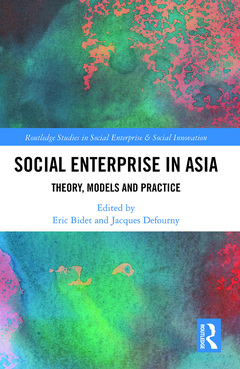Social Enterprise in Asia Theory, Models and Practice Routledge Studies in Social Enterprise & Social Innovation Series
Coordonnateurs : Bidet Eric, Defourny Jacques

In the absence of a widely accepted and common definition of social enterprise (SE), a large research project, the "International Comparative Social Enterprise Models" (ICSEM) Project, was carried out over a five-year period; it involved more than 200 researchers from 55 countries and relied on bottom-up approaches to capture the SE phenomenon. This strategy made it possible to take into account and give legitimacy to locally embedded approaches, thus resulting in an analysis encompassing a wide diversity of social enterprises, while simultaneously allowing for the identification of major SE models to delineate the field on common grounds at the international level.
These SE models reveal or confirm an overall trend towards new ways of sharing the responsibility for the common good in today?s economies and societies. We tend to consider as good news the fact that social enterprises actually stem from all parts of the economy. Indeed, societies are facing many complex challenges at all levels, from the local to the global level. The diversity and internal variety of SE models are a sign of a broadly shared willingness to develop appropriate?although sometimes embryonic?responses to these challenges, on the basis of innovative economic/business models driven by a social mission. In spite of their weaknesses, social enterprises may be seen as advocates for and vehicles of the general interest across the whole economy. Of course, the debate about privatisation, deregulation and globalised market competition?all factors that may hinder efforts in the search for the common good?has to be addressed as well.
The first of a series of four ICSEM books, Social Enterprise in Asia will serve as a key reference and resource for teachers, researchers, students, experts, policy makers, journalists and other categories of people who want to acquire a broad understanding of the phenomena of social enterprise and social entrepreneurship as they emerge and develop across the world.
Introduction: The Rising Interest for Social Enterprise in Asia
Eric Bidet and Jacques Defourny
Part I: National Overviews of Social Enterprise
1. Social Enterprise in Cambodia: Typology and Institutionalisation
Sothy Khieng and Isaac Lyne
2. Social Enterprise in China: Key Features and New Trends
Xiaomin Yu
3. Social Entrepreneurship in India: Models and Application
Anirudh Agrawal and Prajakta Khare
4. Social Enterprise in Indonesia: Emerging Models under Transition Government
Aluisius Hery Pratono, Pauline Pramudija and Ari Sutanti
5. Models of Social Enterprise in South Korea
Eric Bidet, Hyungsik Eum and Jieun Ryu
6. Taiwanese Social Enterprises: A Context Marked by Strong Interactions between the State and Civil Society
Yu-Yuan Kuan and Shu-Twu Wang
7. Social Enterprise Landscape in Thailand
Prapin Nuchpiam and Chanya Punyakumpol
Part II: Social Enterprise in Specific Fields
Social Enterprise and Rural Community Development
8. The Emergence of Community-Oriented Rural Social Enterprises in Japan
Matsuyo Makino and Ken’ichi Kitajima
9. Social Enterprise for Rural Community Development: Lessons from Two Case Studies in Taiwan and Indonesia
Aluisius Hery Pratono and Yu-Feng Wong
Social Enterprise and Health and Social Services Provision
10. Social Enterprise Models Providing Health and Social Services in Japan
Akira Kurimoto
11. Social-Service-Provision Social Enterprises in Korea
Deok Soon Hwang
Social Enterprise and Social Inclusion
12. Social Enterprise in the Philippines: Social Enterprises with the Poor as Primary Stakeholders
Marie Lisa Dacanay
13. Dependent Interdependence: Government/Non-Profit Relationship in Human Services in China
Yuanfeng Zhang and Huifeng Zhang
Part III: Comparative Analyses and Perspectives
14. Religious Influences on Social Enterprise in Asia: Observations in Cambodia, Malaysia and South Korea
Isaac Lyne, Jieun Ryu, Yong Yuan Teh and Tetsuya Morita
15. Social Enterprises and Agricultural Value Chains in South-East Asia
Marie Lisa Dacanay
16. Asian Social Enterprise Models in a Worldwide Perspective
Jacques Defourny, Marthe Nyssens and Olivier Brolis
Conclusion: Main Highlights about Social Enterprise in Asia
Eric Bidet and Jacques Defourny
Eric Bidet is an associate professor at the School of Law, Economics and Business Administration of Le Mans University (France), where he is the director of the Master in Social and Solidarity Economy. His research on social enterprise has been supported by the Korea Foundation, Field Research Programme.
Jacques Defourny is a professor of non-profit and cooperative economics and comparative economic systems at HEC Liege - Management School of the University of Liege, where he serves as the director of the Centre for Social Economy, which he founded in 1992.
Date de parution : 03-2021
15.2x22.9 cm
Date de parution : 06-2019
15.2x22.9 cm
Thèmes de Social Enterprise in Asia :
Mots-clés :
Work Integration Social Enterprise; Social Enterprise; Inter Institutional Systems; Social Entrepreneurship; CSR Strategy; Entrepreneurship; Long Term Care Insurance; Social Innovation; Non-profit Organisation; Social Business; Social Policy; Result Hereof; Non-profit Sector Management; Civil Society; Innovation Management; SE Model; Development Economics; Bina Swadaya; Asia; Social Solidarity Economy; Cambodia; China; Social Business Model; India; Chinese Government; Indonesia; Alter Trade; South Korea; Social Enterprise Promotion; Taiwan; Social Enterprise Sector; Thailand; Transformational Services; Japan; ENP; Philippines; Consumer Cooperatives; globalised market competition; CDEs; International Comparative Social Enterprise Models; Current Ceo; privatisation; Health Cooperatives; deregulation; Community Farming Organisations; CYDF



